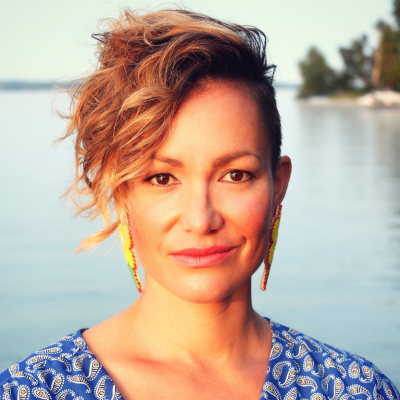Honorary Degree Profile: Waneek Horn-Miller
 Ms. Waneek Horn-Miller is a celebrated Olympian, an inductee into the Canadian Sports Hall of Fame and a strong supporter of youth in sports. And, since being cast into the public consciousness at an early age, she has emerged as a renowned advocate for Indigenous and human rights.
Ms. Waneek Horn-Miller is a celebrated Olympian, an inductee into the Canadian Sports Hall of Fame and a strong supporter of youth in sports. And, since being cast into the public consciousness at an early age, she has emerged as a renowned advocate for Indigenous and human rights.
Ms. Waneek Horn-Miller was born in Montreal to Mohawk parents and raised in Kahnawake, Quebec. Her mother, Kahn-Tineta Horn, was an Indigenous activist and a negotiator during the 1990 Oka Crisis, a highly-publicized land dispute between Mohawk protestors and provincial police in Quebec. Shockingly, as a teenager, Ms. Horn-Miller was stabbed in the chest by a Canadian soldier’s bayonet while carrying her young sister out of the protest encampment through a chaotic crowd.
Remarkably, she recovered to carry the flame in the 1991 Sacred Run Canada and 1992 Sacred Run North America, events that promote strength and unity between Indigenous communities.
Her illustrious sports career in the water began in childhood. She won 20 gold medals at the North American Indigenous Games, including one for rifle-shooting. She became Carleton University’s first Female Athlete of the Year, a title that she held for three years. Ms. Horn-Miller was voted Most Valuable Player at the women’s national water polo team Championships in 1999, and was a member of the Canadian team that won the gold medal in water polo at the 1999 Pan American Games and a bronze medal at the 2001 FINA World Aquatic Championship Tournament.
Ms. Horn-Miller was the first Mohawk woman from Canada to compete in the Olympic Games. Prior to the 2000 Games she appeared on the cover of TIME magazine to promote her sport and serve as a positive, female role model. She was chosen to be torchbearer for the 2010 Olympic Winter Games in Vancouver.
She became a commentator at the Olympic Summer Games in Athens, and Beijing and hosted coverage of the 2010 Olympic Winter Games in Vancouver on the Aboriginal Peoples Television Network (APTN). She launched a fitness and healthy-eating initiative with the network and served as assistant chef de mission for the 2015 Pan American Games in Toronto.
To support Indigenous youth and to encourage more engagement in sport, Ms. Waneek Horn-Miller became an IndigenACTION ambassador to the Assembly of First Nations, a strategy to look into developing a National Indigenous Sport, Fitness and Wellness Strategy. Waneek also has presented at many WE Day national events and is currently an ambassador for Nike N7. In April 2018, the motivational speaker was chosen to work on the Working Group on Gender Equity in Sport to address glaring gender inequality for Canadian women in sport.
Outside of sports, Ms. Waneek Horn-Miller served as the director of community engagement for the National Inquiry into Missing and Murdered Indigenous Women and Girls. On a more personal front, she took part in a challenge against the ‘Marry Out, Get Out’ policy in 2018 after being presented with eviction notices from the Mohawk Council of Kahnawake. The action
stemmed from a council law that banned any Indigenous band member with a non-Indigenous spouse from living on its territory. The Superior Court of Quebec subsequently ruled that the law violated the Canadian Charter of Rights and Freedoms.
She has received many athletic awards including: 2019, Induction into Canada’s Sports Hall of Fame; 1999, gold medal, Women’s Water Polo, Pan American Games; 1999, Most Valuable Player Award, Canadian Senior Women’s Water Polo National Championships; 1999, Tom Longboat Award; 1994-97, Female Athlete of the Year, Carleton University; multiple medals, North American Indigenous Games.
For her advocacy she earned the 2000, Youth Award, National Aboriginal Achievement Awards; 2015, DAREarts Cultural Award; 2015, Most Influential Women, Canadian Association for the Advancement of Women and Sport and Physical Activity. She has also been recognized with Honorary Doctor of Laws (LLD) from Mount Allison University in 2018.
She graduated with a degree in Political Science from Carleton University in 2000 and is completing a master’s degree in Indigenous Studies in Kinesiology at the University of British Columbia.
In acknowledgment of the recognition from Trent University, Ms. Horn-Miller states, “To be recognized for my contribution by Trent University is an incredible honour. Trent has always been a leader in the field of Indigenous Studies and this honour is one that means I am being recognized by a university that understands the Indigenous landscape and the reason for the work I have done and the contributions I have made. Nia:wen Kowa for this gift of good medicine.”